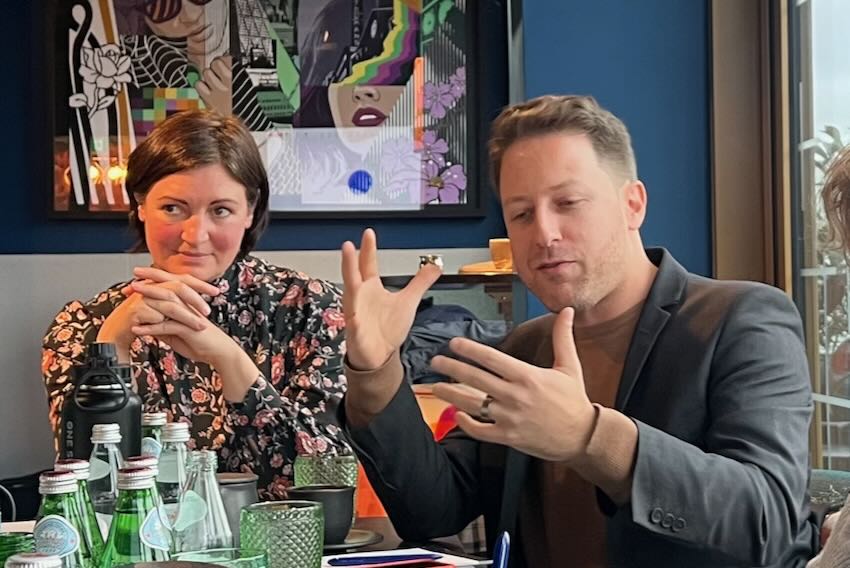
Felicity Cousins, editor of Sustainable Hotel News, launched Sustainability Bites with Michael Mason-Shaw, regional director of operations Cycas Hospitality UK, to bring together experts to discuss sustainability topics impacting the hospitality and tourism sector.
Hosted by Hyatt Place London City East, the second Sustainability Bites took place at the end of November with a select group of leaders from the industry invited to a round table chat about circularity in the hospitality space.
Joining Michael Mason-Shaw and Felicity Cousins were; Tommie Eaton, Clean the World and founder Bambuu Brush, Bryan Oknyansky, head of sustainability, Studio Moren, Juliane Caillouette Noble, managing director, The Sustainable Restaurant Association, Debbie Hindle, chair of the International Centre for Responsible Tourism global (ICRT global), Joanne Taylor-Stagg, general manager, The Athenaeum Hotel, London.
The event took place in Pocket Square, a modern, bright and airy space on the 9th floor of the hotel, with doors opening onto the terrace. The rain was falling fast (as it was at our last gathering), so we sat together in the warmth of the room focussing all of our efforts on the topic in hand.
Why circularity?
It’s all about the why when it comes to sustainability. People need to know why they are taking action so they can adapt any strategy as time goes on – and this is why we wanted to talk about circularity and how hotels can bring new systems into their operations – to enhance and evolve any sustainable strategies going forward.
According to the EU’s A New Circular Economy Action Plan, “Global consumption of materials such as biomass, fossil fuels, metals and minerals is expected to double in the next forty years, while annual waste generation is projected to increase by 70 per cent by 2050.” This means we would need three planets, not one, to deal with our continued consumption and our waste.
And although 80 per cent of waste can be recycled or reused, only 40 per cent of household waste is recycled, and just 6 per cent of commercial waste – so that’s 94 per cent of commercial waste going to landfill – or even more if you consider that 40 per cent of waste, which goes to recycling, might also end up in landfill because of contamination.
When we talk about hotels, how waste is processed is a big topic, and while the hotel industry has embraced recycling and there are brands which endeavour to achieve zero waste and promote upcycling, re-using and sourcing sustainable products for their properties, the reality is most hotels and their supply chains are not doing enough.
The group at the table wanted to explore why this was the case and also if the challenges stopping hotels from being more conscious about their waste were financial, operational, to do with infrastructure or a lack of government support or perhaps to do with guest behaviour, awareness and attitude.
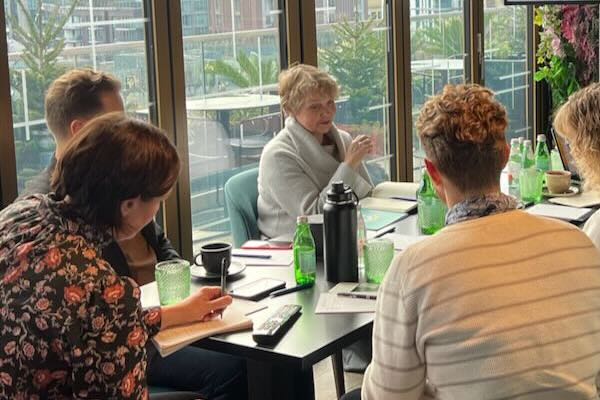
Definition of circularity
We needed to define what circularity meant to us to check we were all on the same page. Studio Moren’s Bryan Oknyansky said for him the longevity of circularity has to be considered but that ultimately the definition was simple. “It’s a commitment to not being wasteful.” He added that circularity applies to “absolutely everything” and people tend to forget that financial sustainability is just as important as any other topic of sustainability.
Clean the World and Bambuu Brush’s Tommie Eaton agreed with Oknyansky and noted there is a lack of awareness from consumers and the industry about the role circularity can play in helping with sustainability but that ultimately “it’s extending the life of something.”
“If we’re talking 80 per cent can be reused we also need to talk about replacing or regenerating the things we’ve taken,” added The Athenaeum’s Joanne Taylor-Stagg. “So reducing it as much as possible, but making sure that, if we are cutting down trees, in a very simple example, we are then replanting. And making sure that we reduce what we waste, but also that we replenish.”
Oknyansky agreed: “Diversion from landfill is how I talk about it.”
Juliane Caillouette Noble from The Sustainable Restaurant Association said that she believed the fundamental principle whenever talking about circularity is that resources are finite. “A circle is a finite shape and so the premise of circularity is that you have to start any discussion by saying that resources are finite, and because resources are finite, when you take something out you have to give something back. If there’s an end of life, how does that end of life become the beginning of life for the next thing?”
ICRT global’s Debbie Hindle agreed. “Culturally I suspect that many businesses and consumers don’t think of this as a finite world. There’s an assumption I’ve done my bit – I put my stuff in recycling. They don’t think beyond that. So it’s our job as a whole industry to consider the implications of a finite world and that drives everything.”
Taylor-Stagg noted that with 9 billion people we will need three planets worth of resources if we don’t re-use and recycle. “We need to get a move on.”
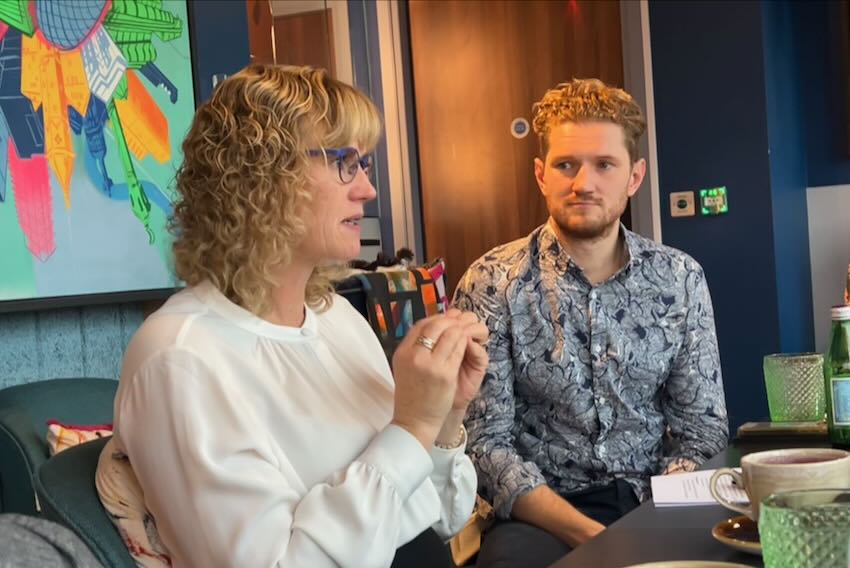
Storytelling
What became apparent as we were talking about the definition of circularity was there seems to be a lack of thought in the processes and supply chains across not only the hotel sector but other industries. We discussed how the consumer might choose different options if they understood the real story behind a product, or service, and how the importance of sustainability storytelling was key. To engage consumers in the story, as they are very much part of the story, could develop the plot in the ‘right’ direction.
Eaton talked about a plastic recycling business Clean the World works with, where the owner wants to pass the business down to the next generation but knows there is a finite amount of petrol left in the world for plastic. “So he’s trying to keep all of that plastic, which goes through his plastic recycler, in the system so that it comes back into his system, so his business is still there for his children. Yes, he is thinking about sustainability but he’s a businessman too, so he’s looking further down the line.”
Editor Felicity Cousins noted that the idea of stretching sustainable storytelling to the limit was aligned with the story we all tell ourselves when we travel. We know taking flights and staying in hotels is damaging to the environment but we tell ourselves that the benefits of travel outweigh any negativity. Understanding and experiencing different cultures is something too important to stop. “However, if we look at it all through a lens of sustainability, we can do better.”
Oknyansky said: “Well I love travelling and I don’t want you to take my flights away. All of life’s experiences have a carbon cost to them. Our favourite food, our favourite films, the favourite destinations we like to go to, so happiness is related to carbon. If we just focus on how to reduce carbon, or water usage or heating water are we designing out all of life’s experiences and joy?”
“Yes!” said Taylor-Swagg. “And if we do that no ones getting on the bus…!”
Caillouette Noble noted that the hospitality industry, whether that’s travel or restaurants, is at the brunt the coal face. “We need to ask can I do this into the future? With the impacts of climate on the food system, can you run this restaurant in the future? The reality of “is this business going to be there for you to pass on?” We need to elevate the stakes of that more.”
The challenge for hotels around guest expectations
Cousins added that the “farm-to-table” storytelling for restaurants and hotel restaurants has been a strong message for consumers. “Some [hotels or restaurants] might be keen to show they’ve got everything from within 10 miles because it makes the consumer feel better.”
But Taylor-Stagg put across another angle to the local produce story, with the idea that by changing our habits to sourcing produce locally, we may be impacting people further down the supply chain who rely on us for their livelihood.
“Something like 80 per cent of our green beans come from Kenya, so if tomorrow we all turn around and say right, that’s it everything’s has to be within a 10 mile radius. That’s all. Kenya’s gone.” She said. “And we’ve seen that with quinoa and we all feel great, but there’s people starving somewhere else because of a decision we made. So I think we have to have a balance in this and I don’t believe we can be isolationist.”
Cousins agreed that there had to be a balance – “but isn’t it ultimately the aim to change people’s attitudes so they don’t come and say ‘I want a pineapple’ when it’s out of season?”
Taylor-Stagg said: “I agree with that but I don’t think we’re there, and I think it it’s going to be a very slow process.” She went on to give an example of a product guests want every day but which might not be the most environmentally friendly option.
“Everyone wants sourdough toast with avocado and poached egg. That is standard breakfast.”
However, with the water used in producing avocados the hotel looked into how they could change this part of the menu. They educated the hotel team about how much water it takes to grow avocados and added an alternative to the menu, offering sourdough toast, poached egg and spinach – as well as the avocado option.
The uptake of the spinach option was nowhere near the uptake of the avocado option. Taylor-Stagg said: “Even when you are trying to do the right thing we also need to be practical and keep in mind the guests still want avocados – but make those avocados as ‘green’ as possible.”
Caillouette Noble argued that even if guests still want a product, it’s the hotel or restaurants’ responsibility to change that. “We need to challenge ourselves – yes we are here to please guests and create memorable experiences but if we are still not taking it off the menu we are giving permission to the diner to think “it can’t be that bad if its still on the menu so I’m still going to choose the one I want.”
As a side note – we were not attacking avocados here – although the did keep popping up in the conversation – it just happened to be the example we were talking about on hotel breakfast menus. Meat is much more water intensive as a product. For example, a single avocado might use 320 litres of water, while a single hamburger might use 2,400 litre of water.
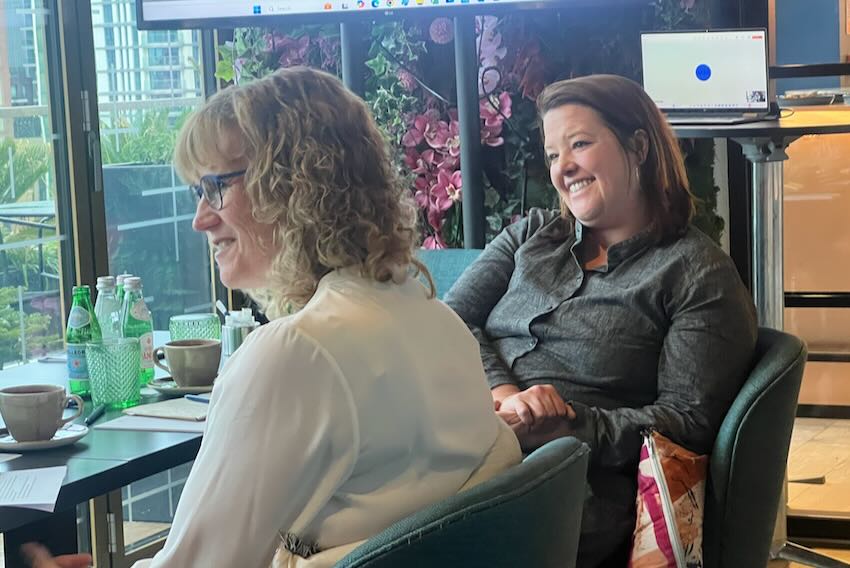
Taking responsibility
Caillouette Noble talked about some research The Sustainable Restaurant Association had done about fish, which found that most consumers were adamant they would only eat sustainable fish and would not eat an endangered species. “But then they will eat Bluefin tuna if they see it on the menu. So we have to get bold enough to take it off the menu without guests feeling deprived.
“We have to be more creative and still create a beautiful experience so they don’t feel they are deprived.”
“Yes. It’s like everybody cares about the environment until they want their air conditioning on,” added Taylor-Stagg. “We need to find other ways because if I’m honest my hotel wouldn’t exist if we focused solely on sustainability. I’m at the luxury end of the market and our guests want what they want.”
Oknyansky said: “If you define luxury as exuberance – more is more – then where is its place in a more circular future? Luxury can also be less is more and luxury can be a community story and therefore is there a renaissance for businesses to redefine themselves though the lens of sustainability storytelling?”
“That’s the problem though,” said Caillouette Noble. “Sustainability messaging is aligned in peoples’ minds with deprivation. The avocado on toast being taken away. People don’t go to a hotel because it serves avocados on toast and they won’t walk out because you didn’t give them avocados on toast – if you give them a beautiful breakfast. However, they will walk out if you don’t give them a beautiful breakfast… and so the challenge becomes how do you give them a beautiful breakfast in your prices constraints etc..”
Taylor-Stagg said: “I agree it’s about an experience – that’s why people choose to stay with us – but I also think the biggest impact is what they don’t see.”
The Athenaeum Hotel has measured its carbon per guest per night for more than three years. When it began taking these measurements the results were more than 50 kilos of carbon per guest per night. Now it is around 7 kilos per guest per night. “We’ve done that by focusing on things the guests don’t see. It’s been about educating our team on waste and recycling, which is now up to 60 per cent, from what it was at 20 per cent. Also we have to empty our hot tub four times a week, which used to be wasted water, but now we take that water and use it to flush our back of house toilets”.
This is a prime example of how a hotel has changed something in its operations without impacting on guest satisfaction, while still keeping the staff onboard because they’ve been kept in the loop.
ICRT global’s Hindle referred back to restaurants and hotels being in control of the story. “The industry needs to lead consumers rather than expecting them to change. However, we have to do it in a positive way. Most people don’t know what their carbon budget should be, but if you share this information with people then very gradually they can start to make decisions.
“There is also often an assumption that sustainability is more expensive but in flight terms often it’s the cheapest option because it’s a direct flight. We can’t rely on consumers to come with us because we have too much to do in too short a time. We, behind-the-scenes, need to make it happen.”
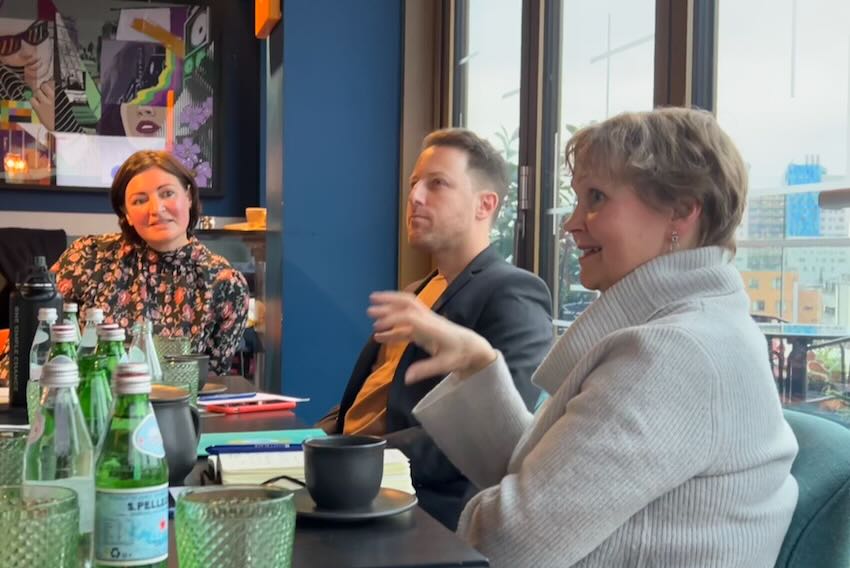
Net zero Vs circularity
Eaton said part of the issue with achieving circularity was there has been such a huge focus on Net Zero, which had put pressure on everyone achieving those targets rather than forming best practice in the long term.
“I disagree with Net Zero being our main focus,” he said. “There was a big awareness around sustainability and the Paris Agreement and people talked about Net Zero but no one understood the term – there was an education gap. Circularity is an easier topic to understand.”
Caillouette Noble agreed it was because of Net Zero incentives there is now an issue with what to do next. “There’s this idea that if it doesn’t meet carbon goals then it doesn’t work – whereas actually it might be better to do things another way and shift the storytelling to regeneration and circularity.”
The table discussed how we might buy a product, which is made of sustainable material and then send it off to be recycled but there is no thought of what happens next. It was agreed that product development should focus first on end of life solution and work backwards to make sure there are systems in place to extend the life of the product.
It was acknowledged with hotels this is hard as the supply chains are so vast and complex, but Taylor-Stagg emphasised: “It’s our responsibility as hoteliers to look for suppliers who are responsible.”
Taylor-Stagg gave an example of the hotel looking for more sustainable slipper options. After a lot of research it found a product it is happy with and the slippers can be recycled or sent back to the company to be recycled, but it would be better – although logistically probably impossible – for different properties to work together. If only hotel suppliers could all deliver products and take away those which can be recycled on the same shipment.
“We need to get to the point where we are working with better systems,” Taylor-Stagg said.
Food waste and circularity
Hindle talked about the opportunity for hotels to create circularity with food waste citing Sivatel Bangkok Hotel, as the winner of the award for Increasing Local Sourcing and Creating Shared Value at the Global Responsible Tourism Awards for its work including a ‘From Kitchen to Chicken’ programme. The initiative focuses on transforming organic waste into feed for black soldier fly larvae, which is a high protein, and high in calcium, feed for chickens.
This system minimises waste while promoting sustainable farming practices and enhancing food security. The Sivatel Bangkok Hotel, achieved zero food waste to landfill in 2023 using this process.
Oknyansky told the story of a hotelier which decided to put smaller plates at the breakfast buffet, and the result was much less waste but big complaints about the size of the plates… and Cousins referred to the Lamington Group’s room2 Chiswick, which is a zero waste property and uses a biomass composter on site where local people share the compost produced. The table agreed this might not be as easy for large chains to replicate.
There was a general consensus that to achieve circularity with food waste there are multiple initiatives hotels can start doing to change the mindset on waste, from AI food waste measurement technology like Winnow, to biomass composters, to creating larvae and so on. Sustainable Hotel News also recently reported that the World Sustainable Hospitality Alliance has a new white paper in partnership with Iberostar Hotels on how to decarbonise hotel food systems.
Nature capital and development
The travel and tourism industry has a significant impact on biodiversity from disturbing wildlife or introducing invasive species, to changing land use for hotels or exploiting natural sites and resources for the benefit of tourists. According to the World Sustainable Hospitality Alliance’s fact sheet on the subject, “Biodiversity can be a vital ally in the fight against climate change, through its ability to absorb emissions and provide a natural barrier against its effects (e.g. tropical storms and rising sea levels). The very survival of the tourism industry relies on the desirability of the unique and varied destinations in which hotels are based.”
With this in mind keeping the “circle” of life going without hotels impacting on this delicate balance is critical.
Cycas Hospitality’s Michael Mason-Shaw, who joined the conversation via audio link, asked what more could be done in hospitality around the regeneration of natural capital. “There is more concrete and plastic in the world today than natural biomass…”
Oknyansky said: “You don’t build on greenfield if you can build more within urban areas. Many already turn their roofs into a sedum or wildflower roof. From a development point of view, high land values require hotels to maximise rooms, potentially at the expense of back of house space, or ceding ground floor area for a bench or a tree. If you could have a contingency for, say, 10 per cent greening on site – if that can be justified at the viability stage from a cost proforma point of view – that’s so important because then the architect has more latitude to increase biodiversity in urban environments.”
Caillouette Noble believed that collaboration at this point becomes really important. “How can land owners create communal opportunities and think bigger than one property?”
With regards to the actual building process Oknyansky said the key time to push circularity for a hotel is in the early stages of development.
“It comes down to cost because at the earliest stage of design you’re afforded bravery and blue sky thinking, and as you near breaking ground for construction, costs tend to come back that necessitate Value Engineering. More often than not, what’s actually being engineered is cost, and circular measures get reviewed through the lens of upfront cost.”
“So being able to be an advocate, a champion, for circularity at the strategic brief definition stage – it sounds academic but it’s literally the most impactful thing you can do.”
Mason-Shaw thought there was a lot more the industry could do around biodiversity. “As an industry we need credible plans around recycling but fundamentally I think biodiversity gets overlooked. We as an industry need to start having some credible framework around biodiversity.”
In a nod to the circularity of our discussion the conversation moved to the importance of governance around ESG, which circled back to our first Sustainability Bites round table about the G of ESG. You can read more about that discussion here.
Oknyansky pointed out that while he is pleased to see the finance sector is driving ESG reporting requirements in lieu of government policy, there is a place for the hospitality sector to take on more lobbying activity. “UK Hospitality seems to be doing a great job – keep applying that pressure to lead the regulations that might one day come, and to instigate consultations with government to set the metrics to judge it. We need more stick and carrot from the government.”
Mason-Shaw agreed that the industry could do more to lobby and have a voice at the table and fundamentally governance is going to dictate the rules and regulations. “If guests don’t care then at least if legally and financially we are obliged to behave and operate in a certain way, it will have a knock on effect on society as a whole.”
A circular menu
After the talk we were treated to lunch by the F&B team at the hotel, which was prepared with circularity in mind. Where possible the team designs menus for events using only organic or certified sustainable produce from British suppliers – to help reduce food mile emissions. The event menu is designed to avoid wastage so a lot of the items were re-used from surplus food, such as the sourdough bread made with surplus porridge from the breakfast service. There was charred Cornish mackerel with compressed cucumber ribbons, cucumber skin powder, cucumber seed gel and British oyster emulsion.
Below you can see the trout skewers – UK freshwater trout has been rated ‘Best Choice’ by the Marine Conservation Society which promotes trout as a sustainable alternative to salmon and so the menu included this trout from ChalkStream farm in Hampshire. As well as cheese and duck dishes there was also a vegan option of seasonal winter squash salad with roasted British squash paired with squash puree and toasted pumpkin seeds with chilli dressing and crumbled stilton cheese. For pudding we enjoyed the “over ripe” banana tarts.
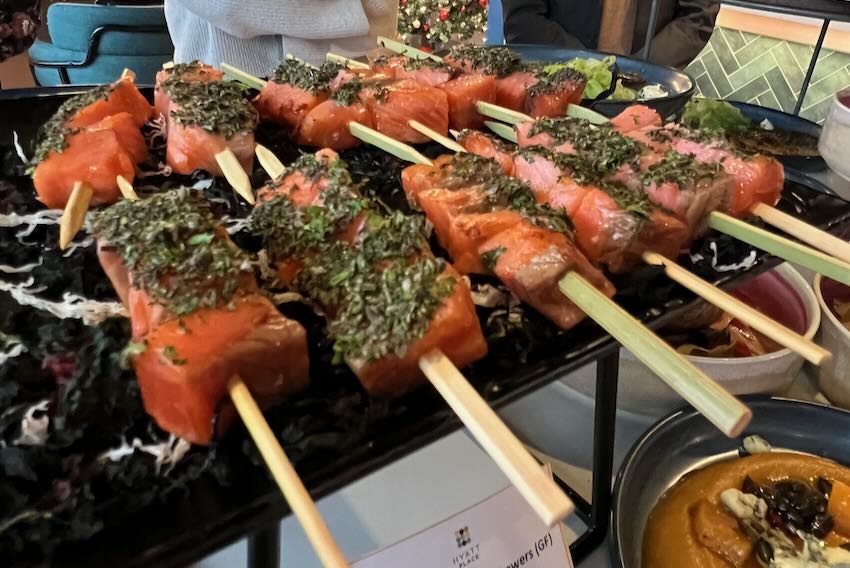
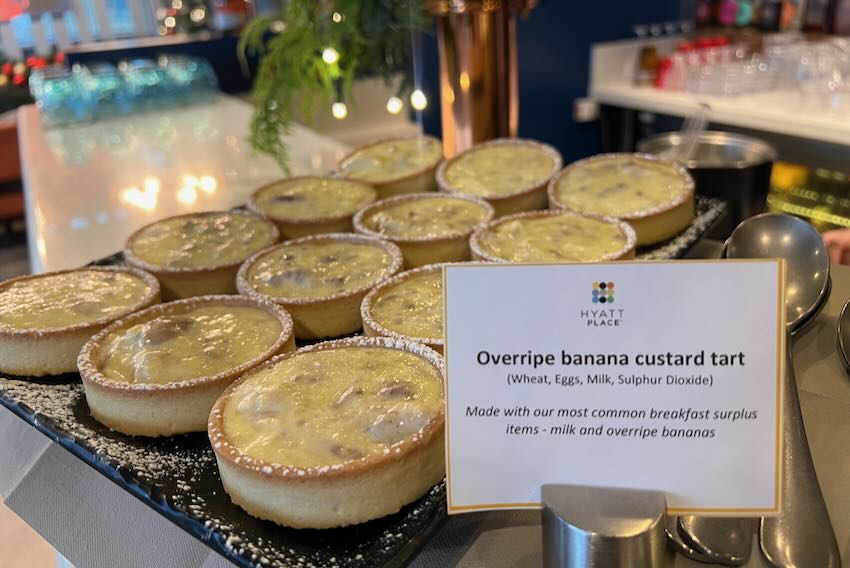

On the day Michael Mason-Shaw was unable to attend the session in person but he joined via audio link to listen to the discussion and add his contributions.
Images: Esther Bell


